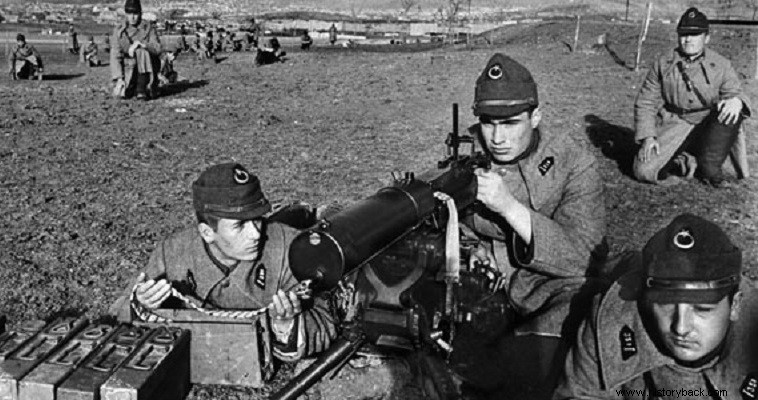
Turkey was linked to Britain and France by an alliance treaty when World War II broke out, but on June 26, 1940, it preferred to declare its neutrality. Hitler, before the invasion of Greece and Yugoslavia, declared in Ankara that he would respect Turkish neutrality.
This declaration resulted in the signing of a friendship pact on June 18, 1941 between Germany and Turkey. Britain and the US also accepted Turkish neutrality accepting that the Turkish armed forces were not ready. So they thought that the correct policy was to strengthen Turkey so that it would prepare and join the allied camp.
Stupid good intentions…
These moves were made on British initiative. American military aid to Turkey began in late March 1941 under the famous Lend-Lease Act. On a British initiative, weapons intended for Britain and Greece ended up in Turkey. Churchill saw Turkey as an allied country that, alongside the allied landings, would contribute to the liberation of the Balkans.
After the meeting in Casablanca between US President Roosevelt and British Prime Minister Churchill, it was decided that Turkey should enter the war on the side of the Allies so that the Balkans would be freed and the precious chromite would stop reaching Germany. The Balkans and Turkey were a key source of supply for the precious ore for the German war industry.
On January 30 and 31, 1943, Churchill met with Turkish President Inonu in Adana with the aim of persuading him to declare war on Germany or at least grant bases on German soil to the Allies. However, the Turks were not convinced citing the unpreparedness of their armed forces and the threat of sovietization of Europe if Germany was defeated... This argument was also used by the Germans!
…and in response miserable maximalism
To circumvent Allied misgivings, in classic Oriental cunning, the Turks demanded in return the concession of 2,300 tanks, 2,600 guns, 1,200 aircraft and 120,000 tons of jet fuel, coal, railway material and of course lots and lots of money, knowing that there was no way they would receive them.
The US, not without reason, began to view the whole issue with skepticism, unlike Churchill who persisted despite the contrary opinion of British Chief of Staff Sir Alan Brooke. In October 1943 at the meeting of the US, British and USSR Foreign Ministers Soviet Foreign Minister Molotov called for joint pressure on Turkey to enter the war on the side of the Allies. The Americans did not accept the proposal because they had stopped seeing benefits from Turkish participation, insisting only on granting bases. The British also rejected it, fearing a strengthening of the USSR.
Roosevelt, Churchill and Stalin discussed Turkey again at the Tehran conference in November 1943. Stalin insisted on putting pressure on Turkey, but again nothing was done. The Turks, always pretending their military weakness, denied any participation.
In December 1943 Roosevelt and Churchill met with Inonu in Cairo asking him for Turkey to declare war on the Axis by mid-February 1944. The Turks appeared, officially, willing, but again they set conditions that could not be met. Churchill warned the Turks that any refusal would mean the end of the "alliance" (!) and Britain's possible support for Soviet claims against Turkey.
Nevertheless the Turks refused again and even humiliated the British by refusing to accept a high-ranking military delegation, but at the same time demanding to be informed of the Allied military plans against Germany! In February 1944, the British military mission left Turkey and at the same time stopped delivering war material to Turkey.
A ridiculous declaration of war
Until then, the US had granted Turkey material worth 43 million dollars at the time. However, Turkey broke off its trade and diplomatic relations with Germany only in August 1944, when the Hitlerian edifice was collapsing, and they declared war on Germany on February 23, 1945, when the Soviets were almost outside the gates of Berlin and the western Allies were pressing on the Rhine.
What did Turkey gain from this policy? Only from the returns on its government bonds, thanks to the allied support, it gained about 260 million dollars at the time. Industrial employment in the country increased by 40% and the Turkish Central Bank came to have a large gold reserve. Finally, it should be noted that Turkey, in terms of tanks alone, received 575 from the Americans and British and many more armored vehicles.
